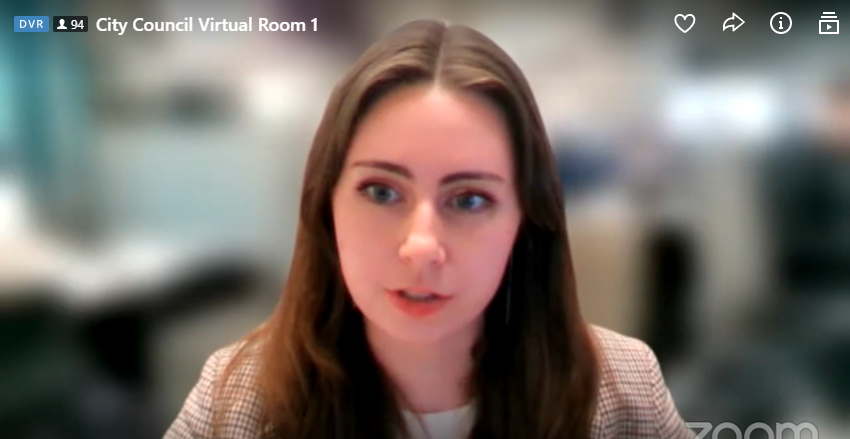Good afternoon! I’m Kara Gurl, Research and Communications Associate at the Permanent Citizens Advisory Committee to the MTA, PCAC. Created by the State legislature, PCAC is the MTA’s official rider advocacy organization, representing riders on New York City’s subways, buses, and Staten Island Railway and the Long Island Rail Road and Metro-North Railroad. Thank you for holding this hearing today and allowing us to weigh in on the city budget and other transit issues that directly and indirectly impact riders on a daily basis.
We were glad to testify and hear from Councilmembers at last week’s hearing on the important issue of Transportation Equity, something that remains a top priority for us. We’ll continue to emphasize the importance of Fair Fares and applaud the Council’s decision, with the Mayor, to baseline $75 million a year for this important program. Increasing outreach and marketing to ensure that everyone who is eligible knows about the program is key. We urge you to consider changing the eligibility criteria to the much higher NYC poverty level, which would more accurately reflect the cost of living here. We also look forward to working with you to promote the use and expansion of the MTA’s new (and existing) fare pilot programs, including Atlantic Ticket, City Ticket and OMNY fare capping, and hope to see them expanded to our Freedom Ticket proposal that includes free transfers to subways and buses.
Riders need to feel and to be safe on transit. Not everyone can afford to choose another option. We support the rollout of the Subway Safety Plan that includes a holistic approach to addressing the issues that riders and transit workers experience underground. We’re glad to see a collaborative approach to bring housing, treatment, and other support to people in need. As you work through the budget, we encourage you to add additional funding for mental health crisis response, supportive housing and longer-term affordable housing, and other programs that address the root causes of the safety issues our city is experiencing. A safe system is one that everyone feels comfortable riding and will use to get to their jobs, to school, to other appointments and activities without fear. That’s first and foremost.
As you work to finalize the city’s budget, we’d like to see the Streets Plan and its commitment to transit Signal Prioritization fully funded in the budget. Our bus system is truly the backbone of New York City, and we support the Mayor’s pledge for 150 miles of new bus lanes and busways in place by the end of 2025 – though sooner is always better. The Streets Plan commitment of Transit Signal Prioritization at 4,750 intersections and upgrades at 2,500 bus stops will also help speed up buses around the city. While we haven’t seen that called out in the budget, we know it is a priority of the administration and hope that you will keep a watchful eye out, as will we and our colleagues in advocacy.
But all the bus lanes in the world won’t work without more and better enforcement. We were disappointed to see that the city is reducing fees for large companies whose trucks park in bus lanes, which sends exactly the wrong message at exactly the wrong time. These large delivery companies – which budget for bus lane parking violations as a cost of doing business in the city – need more of a disincentive to stop blocking bus lanes: we urge the city to rethink this change and instead look at ways it can better benefit bus riders, including by increasing fines for those who park in bus lanes and dedicating funds raised to improving service and speeding up buses. Similarly, we support legislation in Albany to allow the city and MTA to be in charge of cameras, stationary or mobile, at locations determined by the DOT or the MTA. Working together, the City, State and MTA can help bring about a stronger, faster and more equitable bus system for the riders who depend on them every day.
For riders who live in transit deserts requiring long bus journeys to the subway, inaccessible stations only add insult to injury. The City’s $3 billion capital investment will support much-needed accessibility improvements around the system so transit can be the best choice for all New Yorkers, as will Zoning for Accessibility.
We also hope that you’ll encourage the Governor and state legislature to rethink suspending the gas tax in the state budget. Giving drivers such a small amount of short-term relief is not worth losing critical funding for millions of transit riders who have no other option. Instead of subsidizing drivers during a climate crisis, we need to look for ways to invest in public transit to get people out of cars and onto trains and buses.
We’re confident that with continued investment from the city and state, the 21st century transit system riders deserve is within reach. Thank you for holding this hearing and for your continued commitment to riders. Thank you.
